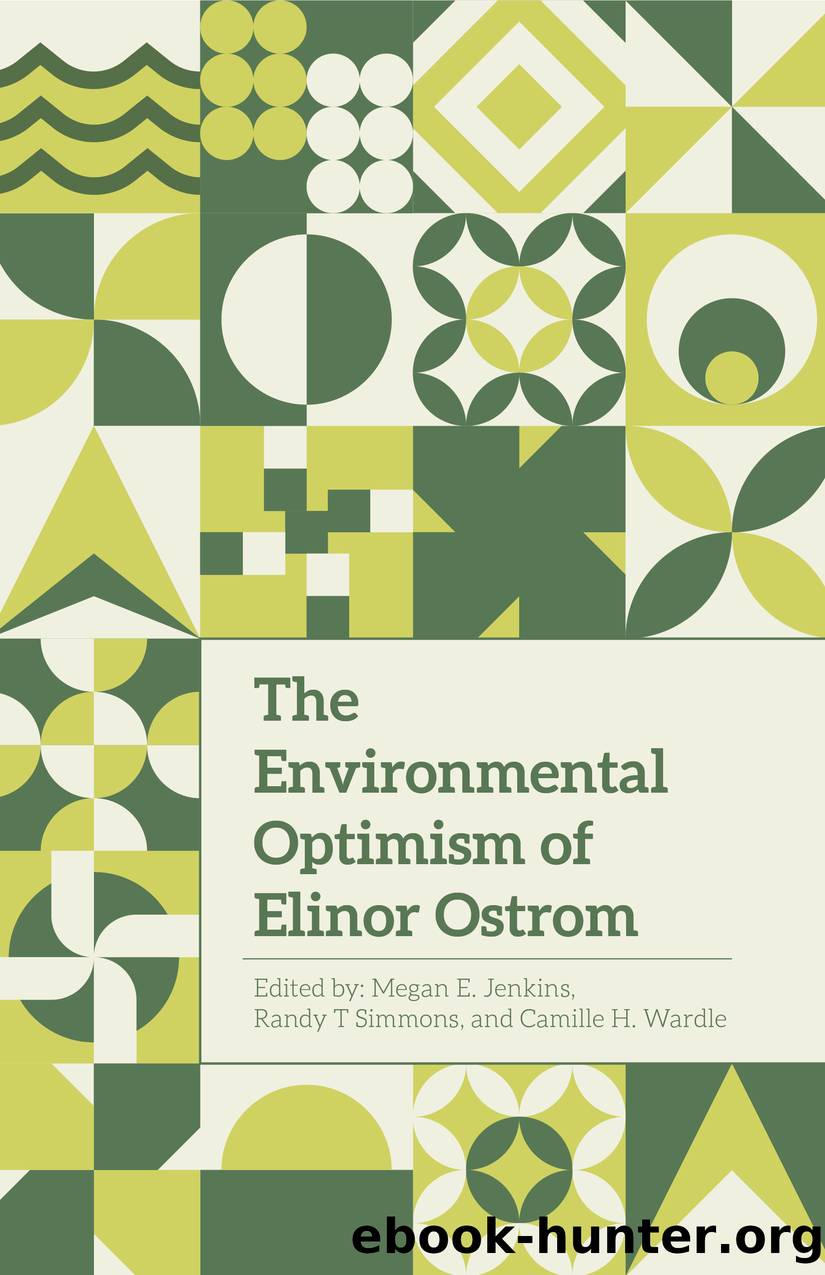Ostrom-25 by Unknown

Author:Unknown
Language: eng
Format: epub
Published: 2020-07-30T17:11:40+00:00
Chapter 5
Contracting and the Commons: Linking the Insights of Gary Libecap and Elinor Ostrom
Eric C. Edwards and Bryan Leonard
In 2009, Elinor Ostrom won the Noble memorial prize in economics sciences for, in the words of the prize committee, âdemonstrating how local property can be successfully managed by local commons without any regulation by central authorities or privatization.â1 This account of Ostromâs contribution focuses on how her work presented a âthird wayâ of governing the commons in direct contrast to the two solutions suggested by Garrett Hardin.2 In critiquing Hardinâs view, Ostrom studied many cases in which resource users, in the presence of weak, dysfunctional, or nonexistent governments, created resilient institutions to manage resource use. In these settings, she demonstrated that self-regulating common-pool resource (CPR) governance can take the place of other institutional arrangements more familiar to economists and political scientists.
Because many of Ostromâs groundbreaking findings emerged from studies of local, self-sustaining governance built on informal norms, economists have tended to view her work as less relevant to governance questions related to industrial resource use in developed countries where formal property rights, regulation, and contracts also play a role.3 One clear exception is found in the work of economist Gary Libecap, who examines settings where the ultimate governance structure is either a contract between resource users or the creation of new formal property rights. Libecapâs approach treats the outcome of property right negotiations as a collective action problem, and in this chapter, we explore how his approach complements and extends Ostromâs work. We also explore key areas of divergence between Libecap, and property rights scholars generally, and the work of Ostrom and other commons scholarsâunsurprising given Ostromâs skepticism of property right solutions as a panacea.4
Starting with Arthur Cecil Pigou, economists have analyzed natural and environmental resource problems against the benchmark of a social planner making optimal decisions.5 In this view, idealized solutions are clear, and the realities of if, or how, they are implemented are a secondary concern. Ostrom and Libecap turn this on its head, studying as their primary research objective how users deal with factors that cause coordination and collective action problems, rather than treating these problems as obstacles to achieving some desired optimal outcome. Both Libecap and Ostrom see the world through the lens of collective action and individual incentives. While Ostrom and her colleagues looked broadly at collective governance, Libecap found parallels between CPR governance and collective action through formal contractual agreements: group characteristics, information problems, and the proportionality of resource distributions being key determinants of success. These results build on Ostromâs work and provide important insight into contemporary environmental and natural resource challenges, where the same factors that cause difficulties in collective action and coordination prevent the adoption of optimal regulatory solutions.6
In comparing Libecap and Ostrom, we acknowledge that both authors have large bodies of work grounded in the empirical realities of numerous cases. It is difficult to fully generalize each authorâs work, and that is not our goal. Instead, we use an illustrative selection of
Download
This site does not store any files on its server. We only index and link to content provided by other sites. Please contact the content providers to delete copyright contents if any and email us, we'll remove relevant links or contents immediately.
Life 3.0: Being Human in the Age of Artificial Intelligence by Tegmark Max(5558)
The Sports Rules Book by Human Kinetics(4388)
The Age of Surveillance Capitalism by Shoshana Zuboff(4293)
ACT Math For Dummies by Zegarelli Mark(4049)
Unlabel: Selling You Without Selling Out by Marc Ecko(3663)
Blood, Sweat, and Pixels by Jason Schreier(3625)
Hidden Persuasion: 33 psychological influence techniques in advertising by Marc Andrews & Matthijs van Leeuwen & Rick van Baaren(3566)
The Pixar Touch by David A. Price(3439)
Bad Pharma by Ben Goldacre(3428)
Urban Outlaw by Magnus Walker(3400)
Project Animal Farm: An Accidental Journey into the Secret World of Farming and the Truth About Our Food by Sonia Faruqi(3221)
Kitchen confidential by Anthony Bourdain(3091)
Brotopia by Emily Chang(3056)
Slugfest by Reed Tucker(3004)
The Content Trap by Bharat Anand(2927)
The Airbnb Story by Leigh Gallagher(2857)
Coffee for One by KJ Fallon(2638)
Smuggler's Cove: Exotic Cocktails, Rum, and the Cult of Tiki by Martin Cate & Rebecca Cate(2541)
Beer is proof God loves us by Charles W. Bamforth(2464)
